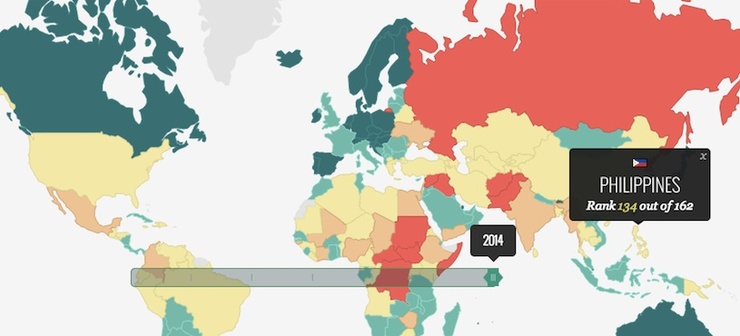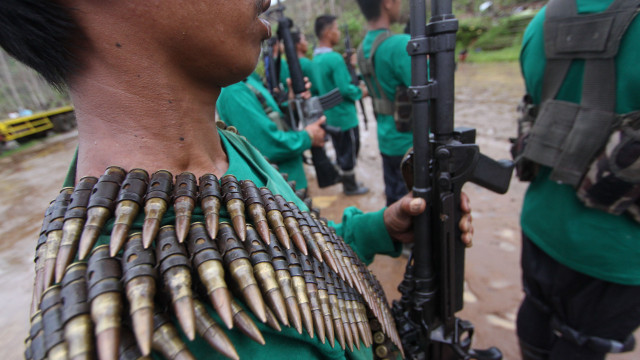On the battlefield, recalls retired Army chief and Medal of Valor awardee Arturo Ortiz, a soldier does not consciously think he has to be a hero. But there are times when the mission—and a brave heart—push one to do a “heroic deed.”
“It is sort of a self-sacrifice, doing something that isn’t
required but you do it just the same. When we are in the middle of a battle, we
never think we should be rewarded for what we are doing,” said the former Army
commanding general.
Ortiz belongs to an elite group of 40 officers who have won
the Medal of Valor—the highest combat award in the Armed Forces of the Philippines
“You just find yourself doing what is beyond the call of duty,”
said another fellow Valor awardee, Army Col. Cirilito Sobejana.
When they are wearing the Medal of Valor, the President and
Commander in Chief can choose to salute them—the only ones in the military
given such honor.
Aside from being a state policy to honor military heroes,
Republic Act No. 9049, enacted in 2001, bestows awardees “adequate social
services and financial rewards to encourage men and women to perform heroic
deeds for their country.”
Except for the monthly gratuity, RA 9049 is mostly on paper
because many institutions and establishments are unaware of it.
Full benefits
Humiliating as it may be, many recipients of the medal and
their dependents have had to bring a copy of the law, their Valor citations and
their birth certificates with them to prove they are entitled to the privileges
stated in the law.
“The problem is there is no IRR (implementing rules and
regulations) for the law,” Ortiz told the Inquirer in a recent interview.
Ortiz, who retired nearly three years ago, serves as the de
facto head of the loose organization of Valor awardees, being the highest
ranking officer among them.
“We are not enjoying the full benefits of the law because
[of] lack of awareness and there’s no IRR to direct government agencies
involved how to provide these benefits,” Ortiz said.
Bravery ‘diminished’
In a way, lack of public awareness of a law that recognizes
a soldier’s bravery “diminishes” the prestige of the Valor award, Sobejana
said.
The Valor awardees make it clear they are not asking for
special treatment. Ortiz and Sobejana said what the awardees hoped for was only
for the law to have implementation rules.
With an IRR, every government department would have the
responsibility to inform the agencies under them how to implement what is stated
in the law.
Sobejana noted the irony of the “full scholarship” accorded
them by the law.
“The law says our children get free tuition and
matriculation. But in the school [that] Sir Art (Ortiz) and my sons attend,
most of the charges fall under miscellaneous fees, which the law doesn’t cover.
We pay for that and so we practically don’t enjoy full scholarship for our
children, as the law intends,” Sobejana said.
At the very least, when their children reach college, they
are given slots at Philippine Military Academy (PMA) as long as they pass the
physical exam.
It is quite insulting, Ortiz said, to feel that he and his
fellow Valors have to beg for the benefits that the state says they should
enjoy.
The stories of the field exploits of the 40 Valor awardees
leave one in awe.
Firefight with NPA
Ortiz received his Valor medal for leading a night operation
against the New People’s Army (NPA) in Murcia
Then a captain, Ortiz and his men made an 11-hour,
cross-country march and scaled a 300-meter cliff to infiltrate the enemy camp.
They crept on the ground until they were 10 meters away from the enemy before
launching a surprise attack.
They overran the large NPA camp and killed 84 rebels in the
two-hour fire fight.
Fighting the Abu Sayyaf
Sobejana was awarded the Medal of Valor after he and his men
fought with 150 Abu Sayyaf bandits in Isabela, Basilan, on Jan. 13, 1995.
Then a company commander of the 1st Scout Ranger Battalion,
Sobejana held his ground although his right arm had been nearly severed by two
bullets.
Biting his right thumb to keep his arm from falling off,
Sobejana continued firing his rifle with his left arm, while giving directions
to his men, maneuvering and exposing himself to the enemy.
In 2013, Sobejana became the chief of staff of the United
Nations peacekeeping mission in the Golan Heights, Israel
Benefits not enjoyed
Sobejana said that to his recollection, no Valor awardee or
his family had enjoyed the 20-percent discount in transportation services,
hotels, restaurants, recreation and sports centers, admission to theaters,
movie houses, concert halls and “other places of culture, leisure, and
amusement” provided for in the law. RA 9049 states the establishments may claim
the cost as tax credits.
Ortiz joked that he will just wait until he turns 60 next
year to enjoy a 20-percent discount with his senior citizen card.
Ortiz and Sobejana said only St. Luke’s Medical Center ,
Makati Medical Center
The law also provides that the Valors and their dependents
are entitled to “free medical and dental services and consultation in hospitals
and clinics anywhere in the country.”
Estrella’s sad story
It is a sadder story for the family of retired Army Col.
Hilario Estrella, who was given the Valor award for leading his men in battle
against 200 heavily armed communist insurgents in Zamboanga del Sur in 1984.
The rebels attacked his 32-man detachment in a predawn raid.
Then a lieutenant, Estrella immediately lost 10 men. When their M60 machine gun
malfunctioned, a wounded Estrella got it back working and fired at the enemies
himself.
The fight took seven hours until the rebels withdrew, with
22 comrades dead, including three commanders.
Family taken hostage
Nearly three decades later, Estrella’s wife, Marilyn, said
it crossed her mind to take down her husband’s photograph in the Gallery of
Heroes at the AFP Museum at Camp Aguinaldo.
Marilyn and her daughter Abby said they felt they had been
shortchanged as the family of a military hero. They said the government seemed
to have left them to deal with the consequences of war on their own.
Marilyn, an Army nurse, had hoped the military could help
her renovate their house, which Estrella vandalized whenever he had a fit.
Once, in a deranged moment and armed with his pistol, Estrella took his family
hostage inside their house.
Abby said it was difficult to get her father medicines that
would keep him sedated, because they weren’t always available.
“My father loved his job more than anything and gave his all
when he was in the service. But I feel the military has ignored us,” said Abby,
18. She has become the custodian of her father’s medals and nameplate.
PMA blast
Estrella’s family and colleagues believe a bomb explosion at
PMA in 1987 triggered the deterioration of his mental health.
Estrella was at the grandstand rehearsing for his conferment
of the Medal of Valor by then President Corazon Aquino. The graduating class
included Sobejana and another would-be Valor awardee, Capt. Robert Lucero.
Estrella suffered burns on his body. A lieutenant colonel,
two other officers and a civilian died in the incident. Among the injured was
PMA Commandant Lisandro Abadia, who later became AFP chief of staff.
When calm, Estrella would read books about war and the
military, or draw up battle plans. Often, he sleeps, withdrawn from the rest of
the world.
The P25,000 monthly stipend Estrella gets as a Valor awardee
is mostly spent on his medication.
What’s bravery for?
Just like Ortiz and Sobejana, Marilyn had experienced having
to bring a copy of RA 9049 to her children’s schools to convince authorities
that they were entitled to scholarships. Marilyn’s daughter dreams of becoming
a commercial pilot but the cost of flight training is dizzying.
The law states that anyone who would deny the Valors and
their dependents the privileges and benefits due them could be imprisoned for
up to six years and fined up to P300,000.
“We could always try to sue but what for? We can only
imagine how much we’d spend for the litigation cost and our lawyers,” Ortiz
said.
Increase gratuity pay
Ortiz said some Valors like him were proposing that their
monthly gratuities be increased to P50,000 if it was difficult for public and
private establishments to give them the scholarships and discounts provided by
the law.
The amount is a long way from the P200 they each used to get
as monthly gratuities for their exceptional bravery before RA 9049 became a
law.
http://newsinfo.inquirer.net/632324/afp-heroes-await-full-benefits-under-law



